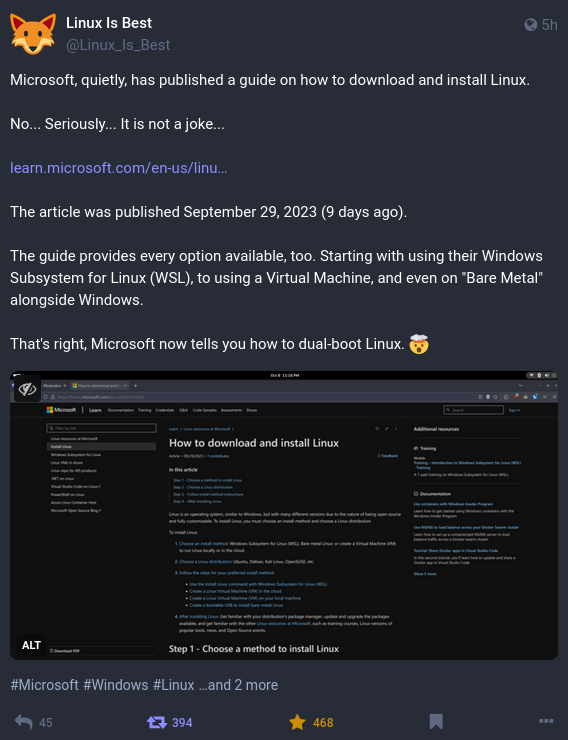this post was submitted on 09 Oct 2023
1835 points (98.2% liked)
Linux
48983 readers
1751 users here now
From Wikipedia, the free encyclopedia
Linux is a family of open source Unix-like operating systems based on the Linux kernel, an operating system kernel first released on September 17, 1991 by Linus Torvalds. Linux is typically packaged in a Linux distribution (or distro for short).
Distributions include the Linux kernel and supporting system software and libraries, many of which are provided by the GNU Project. Many Linux distributions use the word "Linux" in their name, but the Free Software Foundation uses the name GNU/Linux to emphasize the importance of GNU software, causing some controversy.
Rules
- Posts must be relevant to operating systems running the Linux kernel. GNU/Linux or otherwise.
- No misinformation
- No NSFW content
- No hate speech, bigotry, etc
Related Communities
Community icon by Alpár-Etele Méder, licensed under CC BY 3.0
founded 5 years ago
MODERATORS
you are viewing a single comment's thread
view the rest of the comments
view the rest of the comments

To be fair, WSL2 is actually a pretty decent system if you still need to have Windows installed for one reason or another.
It has completely changed my workflow on my work computer and kept me from going insane since my company only allows windows. Having the separate VM I can still use all native Linux tooling and docker-ce is great.
True, for some uses.
If you only need command line use, it's fine. I personally strongly prefer the environment in, say, Linux distribution running Plasma, but if you are fine with Windows applications, then fine.
If you need GUI Linux... WSLG can kind of sort of get you there, but it sucks. So if you live with any Linux GUI application for significant periods of time, then you'll want to strangle WSLg and it's weird behaviors. VcXsrv can help on this front.
If you are like me and find dnf+flathub an appealing strategy for installation and update of software, you like Plasma desktop management, then Linux 'for real' is the way to go.
I mean, if you need an all-up system and you’re stuck on windows… virtualbox still works great afaik. You’ll probably need to fiddle with settings to get stuff like PCIe passthrough working for GPGPU workloads, but afaik it’s quite doable. Sure, there’s a bit of slowdown, but if IT straight up doesn’t let you use another OS on the bare metal… that’s probably the best you’re gonna be able to do.
Or, if you’re sick of the perf hit you get running docker crap on non-linux hosts, you can pick up a used SFF/USFF box from eBay and set that up as a remote docker host for executing stuff there. You might also have to set up your “offload box” to tunnel through your work machine if your projects are hitting internally hosted repos and resources, but you can get it to work if you fool around with it enough.
This is consistent with the "Linux is for backend services and command line" mentality. For me those are nice and important, but I prefer the Linux desktop experience, so those options are of no solace. The VM is ultimately constrained on what it can do UI wise.
I flip the relationship the other way around. Linux on bare metal, Windows in a VM. For people needing windows games, this would be a non starter, however I've got enough games between Linux native, emulators, and proton with steam. Windows as a separate box would be my strategy if needed.